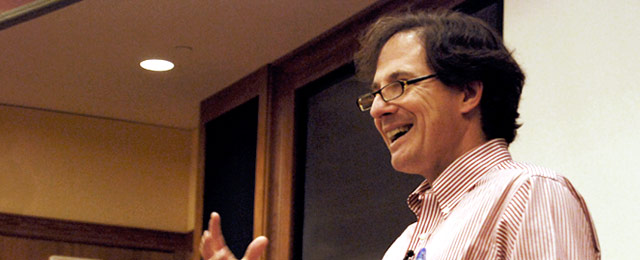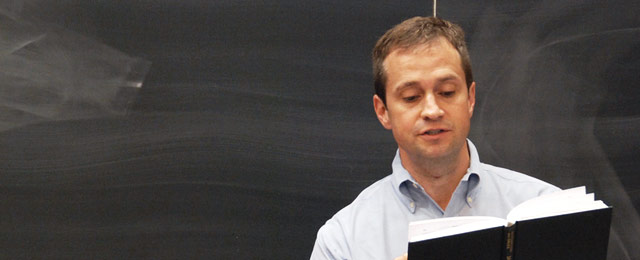Online courses directory (217)
We understand the world — and our selves — through stories. Then some of those hopes and fears become the world.
You will gain a foundation for college-level writing valuable for nearly any field. Students will learn how to read carefully, write effective arguments, understand the writing process, engage with others' ideas, cite accurately, and craft powerful prose. We will create a workshop environment.
Rhetorical Composing engages you in a series of interactive reading, research, and composing activities along with assignments designed to help you become more effective consumers and producers of alphabetic, visual and multimodal texts. Join us to become more effective writers... and better citizens.
Learn to become an effective builder of sentences using the basic tools of English grammar, punctuation, and writing in this FREE and open course. This is a fundamental English writing course.
This course comprises a broad survey of texts, literary and philosophical, which trace the development of the modern world from the seventeenth to the early twentieth century. Intrinsic to this development is the growth of individualism in a world no longer understood to be at the center of the universe. The texts chosen for study exemplify the emergence of a new humanism, at once troubled and dynamic in comparison to the old. The leading theme of this course is thus the question of the difference between the ancient and the modern world. Students who have taken Foundations of Western Culture I will obviously have an advantage in dealing with this question. Classroom discussion approaches this question mainly through consideration of action and characters, voice and form.
This course covers the body of modern poetry, its characteristic techniques, concerns, and major practitioners. The authors discussed range from Yeats, Eliot, and Pound, to Stevens, Moore, Bishop, and Frost with additional lectures on the poetry of World War One, Imagism, and the Harlem Renaissance. Diverse methods of literary criticism are employed, such as historical, biographical, and gender criticism.
Great managers are made, not born. Learn about the qualities and skills of great managers in this Business 101 course. Instructor Sherri Hartzell holds both an MBA and Ed.D., so she's an excellent choice to teach you about principles of management.
Start by learning about the different levels of management in organizations and then dive into how good managers lead to great employees. Students of business, budding entrepreneurs and independent online learners alike can benefit from these short, engaging video lessons and interactive online quizzes. Business 101: Principles of Management can prepare you to earn real, widely transferable college credit by taking the Principles of Management CLEP exam or the Excelsior Principles of Management exam .
The course is an introduction to Dante and his cultural milieu through a critical reading of the Divine Comedy and selected minor works (Vita nuova, Convivio, De vulgari eloquentia, Epistle to Cangrande). An analysis of Dante's autobiography, the Vita nuova, establishes the poetic and political circumstances of the Comedy's composition. Readings of Inferno, Purgatory and Paradise seek to situate Dante's work within the intellectual and social context of the late Middle Ages, with special attention paid to political, philosophical and theological concerns. Topics in the Divine Comedy explored over the course of the semester include the relationship between ethics and aesthetics; love and knowledge; and exile and history.
This course is the second of the three parts of our graduate introduction to semantics. The others are 24.970 Introduction to Semantics and 24.954 Pragmatics in Linguistic Theory. Like the other courses, this one is not meant as an overview of the field and its current developments. Our aim is to help you to develop the ability for semantic analysis, and we think that exploring a few topics in detail together with hands-on practical work is more effective than offering a bird's-eye view of everything. Once you have gained some experience in doing semantic analysis, reading around in the many recent handbooks and in current issues of major journals and attending our seminars and colloquia will give you all you need to prosper. Because we want to focus, we need to make difficult choices as to which topics to cover.
This year, we will focus on topics having to do with modality, conditionals, tense, and aspect.
This workshop is designed to help you write clearly, accurately and effectively in both an academic and a professional environment. In class, we analyze various forms of writing and address problems common to advanced speakers of English. We will often read one another's work.
This survey provides a general introduction to medieval European literature (from Late Antiquity to the Fifteenth Century) from the perspective of women writers from a variety of cultures, social backgrounds, and historical timeperiods. Though much of the class will be devoted to exploring the evolution of a new literary tradition by and for women from its earliest emergence in the West, wider historical and cultural movements will also be addressed: the Fall of the Roman Empire, the growth of religious communities, the shift from orality to literacy, the culture of chivalry and courtly love, the emergence of scholasticism and universities, changes in devotional practices, the persecution of heretics, the rise of nationalism and class consciousness. Authors will include some of the most famous women of the period: Hildegard of Bingen, Heloise of Paris, Marie de France, Christine de Pizan, Joan of Arc, Margery Kempe, along with many interesting and intriguing though lesser known figures.
Writing History is a survey of historical thought, philosophy, and historiography. This course will survey the questions, methods, and debates historians have engaged in over the years and around the world. The course will also address best practices to researching and writing history.
When learning a new language an important first step is to learn the rules of grammar that allow people express what they want to say and understand what others are saying in a coherent manner. An equally important second step is to practise using the rules of grammar to become proficient in communicating in the language. In this free online English language course you will get to practise using important rules of grammar that will greatly improve your ability to communicate in both spoken and written English. You will practise the use of tenses such as the present continuous, past perfect, past simple, present perfect continuous and past perfect continuous to improve your ability to communicate. You will also practise and learn how to use superlatives and comparatives, and practise using reported speech. This free online English language course will be of great interest to all learners who have studied previous English language courses on ALISON such as 'Fundamentals of English Grammar' and 'Introduction to Conversational English', and who now want to further practise and improve their ability to communicate confidently in English.<br />
What is a "life" when it's written down? How does memory inform the present? Why are autobiographies and memoirs so popular? This course will address these questions among others, considering the relationship between biography, autobiography, and memoir and between personal and social themes. We will examine classic authors such as Mary Rowlandson, Benjamin Franklin, Frederick Douglass, Harriet Jacobs, and Mark Twain; then more recent examples like Tobias Wolff, Art Spiegelman, Sherman Alexie, Shirley Geok-lin Lim, Edwidge Danticat, and Alison Bechdel.
The Acoustics of Speech and Hearing is an H-Level graduate course that reviews the physical processes involved in the production, propagation and reception of human speech. Particular attention is paid to how the acoustics and mechanics of the speech and auditory system define what sounds we are capable of producing and what sounds we can sense. Areas of discussion include:
- the acoustic cues used in determining the direction of a sound source,
- the acoustic and mechanical mechanisms involved in speech production and
- the acoustic and mechanical mechanism used to transduce and analyze sounds in the ear.






















